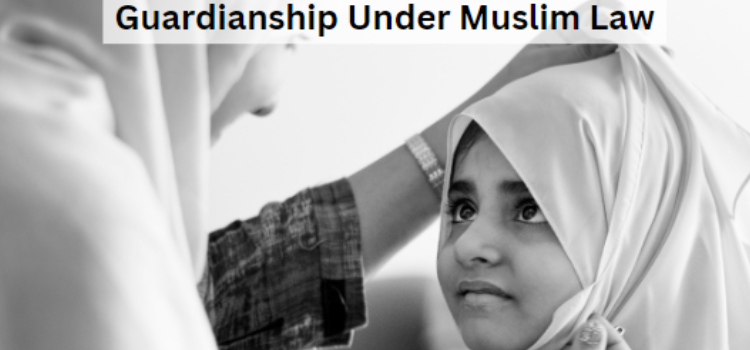Guardianship under Muslim Law
Posted On : June 28, 2023

Table of Contents
Introduction
Under the personal law system in India, different religious communities have their own specific laws governing matters such as marriage, divorce, and inheritance. Muslim personal law, derived from Islamic principles, governs various aspects of family law for Muslims in India. One crucial area covered by Muslim personal law is guardianship, which pertains to the protection and care of minors and individuals lacking the capacity to manage their own affairs. This article explores the concept of guardianship under Muslim law in India, elucidating the rights and responsibilities of guardians.
Concept of Guardianship in Muslim Law
In Muslim law, guardianship is based on the principle of the welfare and best interests of the child or person incapable of managing their own affairs (child). It is a legal relationship where a guardian is appointed to safeguard the rights and interests of the child. Guardianship covers both personal and property matters, ensuring the overall welfare of the child.
It is known as HIZANAT in Muslim law. Sometimes, they are interpreted to mean the same thing. These two parts of guardianship, however, are distinct and are subject to different regulations under Islamic law.
A child is under the general control of their guardian during their entire childhood. The natural guardian of the minor is his father, his executor, or, in his absence, his paternal grandparents. Contrarily, "custody of the child" only refers to the child's actual possession (custody) until they reach a specific age.
The mother has a right to custody of the kid up until the child reaches a certain age, even though she is not the child's natural guardian according to Islamic law. However, the minor is under the full jurisdiction of the father or the paternal grandpa for the whole duration of their minor status.
According to Muslim law, the following guardianships are acceptable
- Legal/Natural Guardian
- Testamentary Guardian
- Statutory Guardian or a Court-appointed Guardian
- De facto Guardian
Types of Guardians under Muslim Law
-
Legal/Natural Guardians
Under Muslim law, the father is considered the natural guardian of his legitimate children. However, if the father is unable or unwilling to act as a guardian, the mother assumes the role. The father's guardianship rights extend to the child's personal life and property until the child reaches majority. -
Testamentary Guardians
A Muslim parent, through a will (testamentary document), can appoint a guardian for their minor child in case of their death. The appointed guardian should be someone who is considered fit and capable of providing proper care and protection to the child. -
Statutory or a Court-appointed Guardian
The court may also appoint a guardian if it deems it necessary for the welfare and best interests of the child. This can occur in situations where there is a dispute between natural or testamentary guardians, or if there is a need to protect the rights of the child. -
De Facto Guardian
In situations where there is no natural or testamentary guardian available, the court may appoint a de facto guardian. The de facto guardian is responsible for the child's care and protection until a natural or testamentary guardian is available.
Rights and Responsibilities of Guardians
The following are some of the rights and responsibilities of guardians under Muslim Law;
-
Custody and Care
Guardians have the right to physical custody of the child and are responsible for their day-to-day care, including providing food, clothing, shelter, and education. -
Financial Management
Guardians have the authority to manage the child's property, make investments, and act in their best financial interests. However, they must exercise their powers responsibly and avoid any self-interest or misappropriation. -
Consent and Decision-Making
Guardians have the power to make decisions on behalf of the child, including medical treatment, education, and religious upbringing. They should always prioritize the child's best interests and consult the child, if capable, when making significant decisions. -
Duty of Loyalty
Guardians must act with utmost loyalty, honesty, and integrity towards the child. They should not engage in any acts that could harm the child's interests, and must avoid conflicts of interest.
Conclusion
Guardianship under Muslim law in India is aimed at ensuring the welfare and best interests of the child. The concept recognizes the importance of responsible guardianship and provides mechanisms to appoint suitable guardians who can protect and care for minors and individuals incapable of managing their own affairs. It is essential for guardians to understand their rights and responsibilities to fulfill their role effectively, always placing the welfare of the child as the foremost consideration. To know more about the guardianship under Muslim law, you should consult a family lawyer near you. It is always advisable to search for “family lawyers near me” to find best family lawyers while searching on the internet.
FAQs
-
What is Section 7 of guardianship act?
The Guardians and Childs Act, 1890, Section 7 provides the Court the authority to issue a guardianship order. The court may appoint a guardian for the welfare of minors, according to this clause. The guardian is able to look after the minor and his belongings. Any guardian may be terminated by the court. -
What are the different types of guardianship?
Muslim law recognizes the following kind of guardianship:- Legal/Natural Guardian
- Testamentary Guardian
- Statutory or Court-appointed Guardian
- De-facto Guardian
-
What is Section 11 of guardianship act?
The Guardian and Wards Act, 1890's Section 11 outlines the application admission process. This provision states that the court will set a hearing date after it is satisfied with the basis for the proceeding. The notification was sent in the way that the Code of Civil Procedure, 1908 as prescribed.
-
Is adoption and guardianship allowed under Muslim law?
Muslims in India are prohibited from adopting children; instead they typically seek guardianship of children under the Guardians and Childs Act of 1890.























